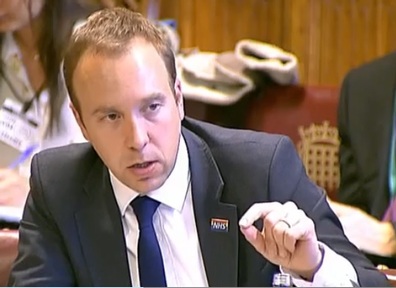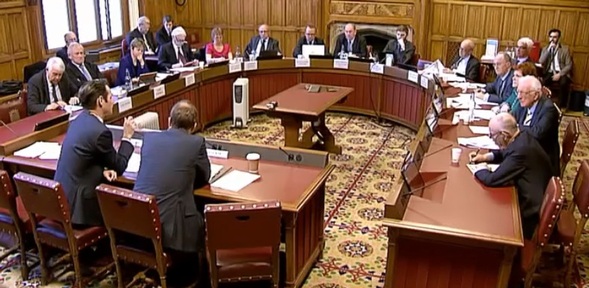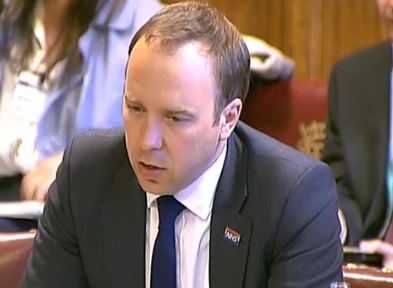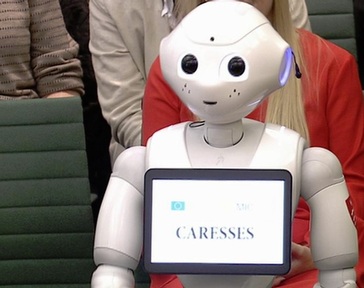Matt Hancock says social care green paper will stop people moving to care homes unless 'clinically justified'
Health secretary Matt Hancock has said the social care green paper will look at shifting people away from care homes to domiciliary care because “more people go into residential care than is clinically justified”.

Matt Hancock told peers at the House of Lords Economic Affairs committee on Tuesday: “I think there’s a big opportunity to make social care better for the individual being cared for and better value for money by a shift from residential to domiciliary care.
Referring to other countries who have already made a ‘big shift’ he said: “A Norwegian minister told me that they had moved from essentially 80 per cent residential to 80 per cent domiciliary care.
Home care 'cheaper' and 'better clinically'
“That direction of travel is good for people being cared for and domiciliary care is cheaper than residential care. People want to stay at home for as long as possible.
“It’s also better clinically. The evidence shows that when people are being discharged from hospital, a far higher proportion go into residential homes than clinically is recommended.
“When doctors say you should be going into your own home with a care package, they end up in residential homes even though residential homes are more expensive.
“That will get a mention in the green paper, I have no doubt.” 
The health secretary said the Department of Health and Social Care (DHSC) has evidence people can stay up to four years longer at home with adaptations made to their home.
Green paper delayed 'due to Brexit'
The green paper is a blueprint for the long-term financial sustainability of social care.
When asked by the Committee’s Chair Lord Forsyth of Drumlean, when the green paper would appear, Mr Hancock looked lost in thought as he said: “The green paper’s publication is… er...is coming…um…in due course.”
“I’m afraid it has been delayed in the break due to Brexit and the need for bandwidth.
“We continue to work on it and continue to improve it. I wish that the green paper had been published by now.”

Lord Forsyth asked: “Would you agree with what most of our witnesses have said, which is that the system does need more funding in order to meet long-term needs?"
Mr Hancock said over the last three years, the government has put a total of an extra £10 billion into social care. He said the budget this year is £3.9 billion higher in real terms than it was in 2015/16.
In the nine months since Mr Hancock became secretary of state, he said an extra £240 million was given last year and £650 million next year.
“Well, I would say that we have put in significant amounts of extra funding, £3.9 billion a year increase on the 2015 levels of funding, is significant. That nine per cent growth is a faster growth than the growth in the population who need care.”
Mr Hancock described his "frustration" that lots of people ask questions about funding in the green paper but other things must also be addressed “including on professionalism, professional qualifications” in the care sector.
“A cap is not a magic bullet”
When peers asked what else would be in the green paper, Mr Hancock said: “There are a whole series of different [social care] injustices. I haven’t yet seen a proposition that solves all of them.
“A cap is not a magic bullet” he said, referring to a financial limit to lifetime care costs paid by individuals. Calling out other "social care injustices", he said: “Some will have saved their whole lives in order to own their own home and they will then be expected to use that home. Others will not put those savings aside and the state will fund them.
“If you have a cancer diagnosis you get different taxpayer treatment than if you have a dementia diagnosis. The existing system is unfair.
“I think there’s a number of social care injustices. The uninsurability of old age care is one of the biggest." The minister said making social care better and fairer would involve having “the ability of all of us to insure".
Attractive idea: State backing social care insurer
“I am quite attracted to the idea that the state might back an insurer to cause this market to come into effect, a similar way that we did in pensions.
"I’ve been attracted to auto-enrolment. The government can set a norm of what happens and then of course, people can opt out.”
He also referred to social care policies of the past as “political hot potatoes”.
Conservative MP and former Cabinet member Damian Green, published a cross-party report ‘Fixing the care crisis’, this week calling for social care provision to be modelled on the state pension. Mr Green proposed a mandatory one per cent National Insurance surcharge for people aged over 50.
Matt Hancock criticised the Labour party front bench for its “aggressive” response to the report. Mr Green is chair of the All Party Parliamentary Group on Longevity but his report was attacked by Labour for its proposal for a national insurance surcharge.
Shadow chancellor John McDonnell called it “a tax on getting old”.

Labour ‘aggressive, partisan and negative’
Mr Hancock said: “We’ve all seen various blow ups in the development of this policy over the years”.
Alluding to Conservative election fallout from social care promises dubbed ‘dementia tax’ and ‘death tax’, he said “having this discussion outside the immediacy of an election cycle is probably wise”.
“What I would like to do is bring forward a green paper that would bring together the debate. It does have to be cross-party.
“It didn’t help on Monday that the Labour party front bench response to the report by Damian Green was aggressive, partisan and entirely negative. That’s not helpful for building a [political] consensus.
“The main political parties have not yet come together to agree this across the divide. The benefits of a good social care system accrue over decades and yet the political challenge of putting one in place is shorter term.”
Robots can’t take over care jobs
The health minister, who has often expressed enthusiasm for technological innovations, told peers: “If artificial intelligence is going to take over a lot of jobs it can’t take over the jobs that are about empathy and caring for people because that needs people.”
Mr Hancock also said he was "sceptical" of think tank The Kings Fund’s recent estimate that 700,000 more care workers will be needed by 2030.
He told peers: “We will need more care workers. I’m naturally quite sceptical of figures projecting a long way into the future and then providing a high degree of accuracy in terms of employment.”
With adult social care provision offered by a multitude of different companies, he said “I think the fact that there are thousands of providers of social care in the UK is a good thing.”
Referring to the 85 per cent of care providers rated good or outstanding by the Care Quality Commission, he explained: “I think that one of the reasons that the proportion of care that’s rated good or outstanding is so high, and higher than the NHS, is partly because there’s a multitude of providers.”
At the end of the meeting, Committee Chair Lord Forsyth of Drumlean told the health secretary: “We look forward to seeing your green paper. It would be interesting to see whether our report comes out before yours".
Latest Features News
 25-Nov-19
2019 Election: Boris Johnson leaves social care in 'too difficult box' but Labour vows to end 'crisis'
25-Nov-19
2019 Election: Boris Johnson leaves social care in 'too difficult box' but Labour vows to end 'crisis'
 18-Oct-19
Podcast: Wendy Mitchell and dementia: 'My biggest fear is not knowing who my daughters are'
18-Oct-19
Podcast: Wendy Mitchell and dementia: 'My biggest fear is not knowing who my daughters are'
 27-Sep-19
Exclusive: Care minister backs care workers' call for time off to grieve and attend funerals
27-Sep-19
Exclusive: Care minister backs care workers' call for time off to grieve and attend funerals
 19-Sep-19
Podcast: Gyles Brandreth says poetry helps ward off dementia
19-Sep-19
Podcast: Gyles Brandreth says poetry helps ward off dementia
 30-Aug-19
Edinburgh Fringe funnyman joins comics facing toughest audience at care home gig
30-Aug-19
Edinburgh Fringe funnyman joins comics facing toughest audience at care home gig